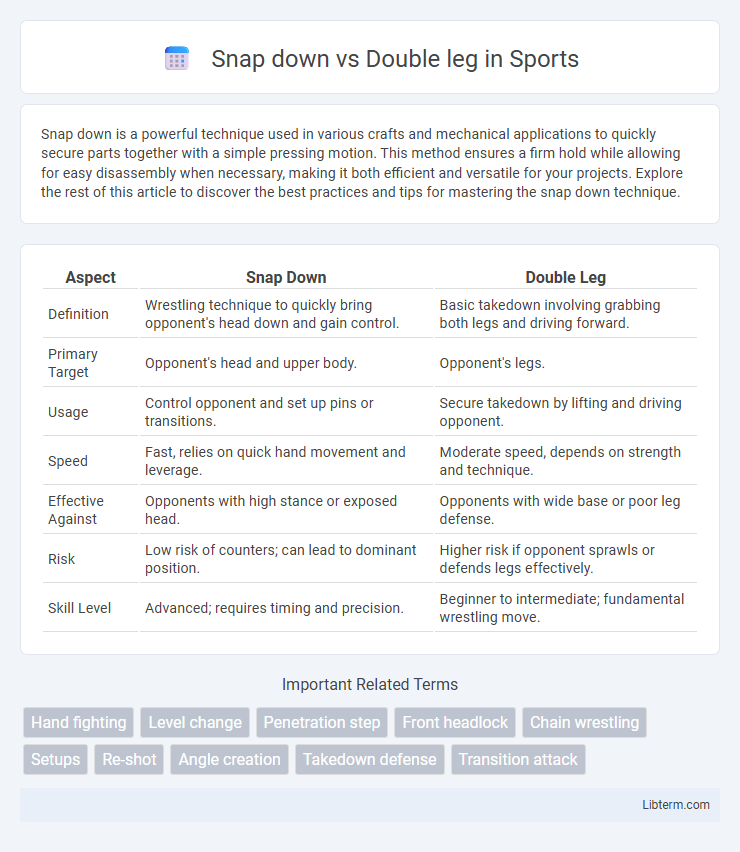Snap down is a powerful technique used in various crafts and mechanical applications to quickly secure parts together with a simple pressing motion. This method ensures a firm hold while allowing for easy disassembly when necessary, making it both efficient and versatile for your projects. Explore the rest of this article to discover the best practices and tips for mastering the snap down technique.
Table of Comparison
| Aspect | Snap Down | Double Leg |
|---|---|---|
| Definition | Wrestling technique to quickly bring opponent's head down and gain control. | Basic takedown involving grabbing both legs and driving forward. |
| Primary Target | Opponent's head and upper body. | Opponent's legs. |
| Usage | Control opponent and set up pins or transitions. | Secure takedown by lifting and driving opponent. |
| Speed | Fast, relies on quick hand movement and leverage. | Moderate speed, depends on strength and technique. |
| Effective Against | Opponents with high stance or exposed head. | Opponents with wide base or poor leg defense. |
| Risk | Low risk of counters; can lead to dominant position. | Higher risk if opponent sprawls or defends legs effectively. |
| Skill Level | Advanced; requires timing and precision. | Beginner to intermediate; fundamental wrestling move. |
Understanding the Snap Down and Double Leg
Understanding the Snap Down involves mastering a technique where a wrestler uses leverage and speed to force the opponent's head down while controlling their upper body, creating openings for further attacks. The Double Leg requires a lower level penetration, where the wrestler drives forward, attacking both legs simultaneously to off-balance and takedown the opponent efficiently. Proper execution of the Snap Down sets up powerful setups for the Double Leg by disrupting the opponent's stance and controlling their head position.
Key Differences Between Snap Down and Double Leg
Snap down targets an opponent's upper body by using a quick downward force on their head or shoulders, creating leverage to control and manipulate their posture. Double leg involves shooting in on both legs to lift and drive the opponent off the mat, aiming for a takedown through leg control and power. The key difference lies in Snap down controlling the upper body and breaking posture, while Double leg emphasizes attacking the lower body to destabilize and finish the takedown.
When to Use Snap Down Versus Double Leg
Choose the snap down when facing a standing opponent in wrestling to quickly bring them to the mat by controlling the head and applying downward pressure. Opt for the double leg takedown when the opponent is lower or off-balance, enabling a powerful, direct attack by driving through their legs to secure control. Use the snap down for speed and control in upper-body dominance, while the double leg is ideal for explosive, lower-body attacks during transitions or scrambles.
Technical Breakdown: Snap Down Technique
The Snap Down technique involves a rapid, explosive hand strike to an opponent's head or wrists, designed to break their posture and create openings for follow-up attacks or takedowns. It requires precise timing, strong grip control, and a stiff-arm to snap the opponent's head downward, disrupting their balance and defensive structure. Effective execution of the Snap Down can transition smoothly into various takedown attempts, capitalizing on the opponent's compromised position.
Technical Breakdown: Double Leg Takedown
The Double Leg Takedown involves shooting in low with a strong, explosive drive targeting the opponent's thighs while maintaining a tight grip behind the knees. Proper technique requires a level head position, hips close to the opponent's body, and a swift, continuous forward movement to take them off balance. Unlike the Snap Down, which relies on upper body control and snap motion to break posture, the Double Leg emphasizes lower body penetration and leverage to secure a dominant takedown.
Pros and Cons of Snap Down Moves
Snap down moves offer rapid leverage to unbalance an opponent by quickly snapping their head down, creating openings for takedowns or transitions, making them effective in both wrestling and MMA. Their main advantage lies in speed and the ability to control the opponent's posture, but the downside includes the risk of overcommitting and vulnerability to counters such as sprawls or ducks. Compared to double leg takedowns, snap downs require more precision and timing, making them less forgiving for beginners but highly effective for skilled practitioners.
Pros and Cons of Double Leg Takedowns
Double leg takedowns offer effective control and quick execution, making them a fundamental technique in wrestling and MMA for securing dominant positions. However, they carry the risk of exposure to counterattacks such as sprawl defenses or guillotine chokes, due to the shooter's forward momentum and lowered stance. Mastery requires precise timing and strong grip control to mitigate vulnerability while maximizing leverage for successful takedowns.
Common Mistakes in Snap Down and Double Leg
Common mistakes in the snap down include improper hand placement and failing to control the opponent's head, which reduces leverage and power. In the double leg, errors often involve shooting from too far away, poor level change, and neglecting to drive with the legs, resulting in weak takedown attempts. Both techniques suffer from a lack of proper stance stability, compromising balance and effectiveness during execution.
Drills to Improve Snap Down and Double Leg
To improve snap down technique, drills such as partner resistance snap downs and rapid shot drills enhance hand speed and control. For refining double leg takedowns, penetration step drills and sprawling counter drills build explosion and defense timing. Consistent repetition of these focused exercises increases muscle memory and effectiveness in live wrestling scenarios.
Integrating Snap Down and Double Leg Into Your Wrestling Strategy
Integrating the snap down and double leg techniques into your wrestling strategy enhances both control and offensive versatility. The snap down effectively breaks your opponent's posture, setting up openings for the double leg takedown to secure dominant positioning. Mastering the transition between these moves maximizes scoring opportunities and improves match control through fluid combinations.
Snap down Infographic

 libterm.com
libterm.com